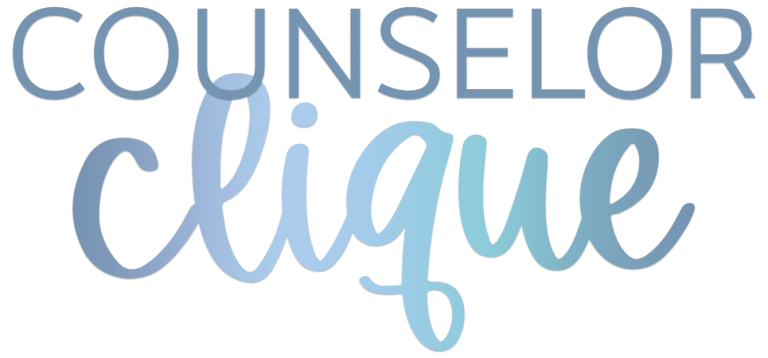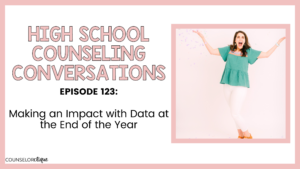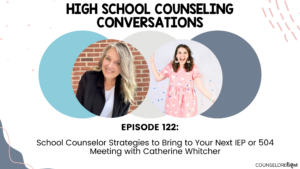
Here's What to Expect In This Episode:
We all have students on our caseload who are falling through the cracks in one way or another. While part of your job is to advocate for these students and find solutions, you don’t have to do it alone.
Establishing a student support team may be one of the best ways that you can help these struggling students. A student support team gives a small group of people in your school the information they need to keep eyes on a student and determine interventions.
In today’s episode, I’ll break down exactly what a student support team is, the logistics of who should be involved, when and where these meetings should take place, and most importantly, what interventions and support can be provided to these students. While there’s not a one-size fits all solution, a student support team just may be the ticket to student success.
PS: Don’t forget to join us in The Clique Collaborative! When you join before September 1, 2023, you’ll receive the exclusive bonuses of a high school curriculum map, the high school digital credit check spreadsheet, and a 30% off coupon to the high school counselor kickstart audio course!
Topics Covered in This Episode:
- Your role in supporting students who are going through a difficult time (and what your role isn’t)
- What a student support team is, and who else might be involved beyond counselors
- How to make your intervention meeting efficient and effective
- What kind of data you might need to have prepared as the school counselor
- The importance of protecting a student’s confidentiality during intervention meetings
- How often to hold student support team meetings
- Prioritizing your next steps after leaving the meeting
Resources Mentioned in This Episode:
Other Blog Posts You Might Like:
- Podcast: Episode 81, Protecting and Prioritizing Student Confidentiality as a School Counselor
- Podcast: Episode 77, What it Looks Like to Implement MTSS In a High School Setting with Dr. Jake Olsen and Dr. Peg Donohue
- Blog: 4 Counselor-Approved Academic Interventions That Actually Set Students Up for Success
Read the transcript for this episode:
0:00
A reminder before we dive into this week’s episode, the Clique Collaborative is currently opened but the bonuses will disappear on September 1. Currently, everyone whether you purchase the monthly plan option or the annual option will get the high school counseling curriculum map, the high school digital credit check spreadsheet, and a 30% off coupon to the high school counselor kickstart audio course.
0:23
When September hits, only annual members will receive the curriculum map and the spreadsheet and the 30% off coupon disappears for everyone. The Clique Collaborative is my high school counseling membership that is PD and community driven. With 25 teaching topics inside and more always being added, I cover pillar topics like advocacy, building your program, classroom lessons, small groups, and more.
0:44
All with appointed High School Counseling focus. If you’re thinking this might be the support you need this school year, I’d encourage you to pop over to cliquecollab.com to see all the details of what’s inside.
0:56
You can also listen to last week’s episode Episode 88, which I’ll link it’s a detailed walkthrough of what to expect with the click collaborative and all the benefits you’ll reap as a high school counselor. I hope I get to see you inside.
1:08
Now let’s shift gears. Today we’re talking about student support teams. Now you can call this whatever in the world you want. But that’s what I’ve always called it. So that’s what I’m gonna continue to call it especially for this episode.
1:20
This is an intervention to wrap around your students on your caseload to help those who are slipping through the cracks in one way or another. A student support team gives a small group of people in the school the information they need to keep eyes on a student and to help in a lot of other areas. Let’s get into the logistical specifics like who, what, where when and more in this week’s episode.
1:49
You got into this profession to make a difference in your students lives. But you’re spread thin by all the things that keep getting added to your to do list. I can’t create more hours in the day. But I can invite you into my Counselor Clique where you’ll finally catch your breath.
2:03
Come with me as we unpack creative ideas and effective strategies that will help you be the counselor who leaves a lifelong impact on your students. I’m Lauren Tingle, your high school counseling hype girl here to help you energize your school counseling program and remind you of how much you love your job.
2:21
We know we’re going to have targeted interventions for students depending on their needs, right? If they’re a first generation college going student, maybe you’re inviting them to a small group with peers in a similar situation to teach show and inspire them through the college application process.
2:35
If you have student athletes that need that extra push to achieve their dreams, there you are helping them stay on track academically and picking their classes, helping them fill out their NCAA eligibility profiles and sending transcripts through that NCAA portal.
2:50
But what about those students who are just lacking motivation, the ones who stopped coming to school, the ones who seem disconnected from adult relationships, the ones who have serious mental health issues? We as high school counselors look at them and see their needs piling and piling up. We’re the ones who understand that, of course, they’re not gonna be focused on school.
3:08
They’re the primary caretaker in their home, or they’re working third shift at the gas station, or they’re not taking their depression meds, whatever the case is, you usually know the student and their situation, but you feel ready to throw your hands up, because how the heck are you going to get them across the stage to graduation with roadblocks this big?
3:27
Before we get into the Student Support Team Intervention, let me just say, you know, I don’t have a magic wand. And I know this because you don’t have one either. There’s not a one size fits all intervention or program to implement to fix these students.
3:41
But hey, that’s not your job anyway. You’re here to creatively find ways to support and push your students in really the most loving ways. You have a unique lens to see a student’s entire situation and advocate for them. But here’s the encouraging part that I want you to hear. You do not have to do this alone. And here’s where this greater team comes into play.
4:03
A student support team is first and foremost, definitely made up of the school counseling team. And the counselors are responsible for who was on their caseload. Duh, of course, you know that, but I’m talking about when we come to the meeting, you’re going to be talking about who is on your caseload.
4:18
So let’s talk about who else could come to a meeting like this and then we’ll get into when it’s going to happen and what we’re going to talk about amongst its team. Other important people to have in the room to come up with supportive interventions for your students would be assistant principals, the principal, attendance clerk, enrollment clerk or registrar, mental health counselor and instructional coach.
4:40
Let’s talk about why each person is there and what their role is when they are there. Full disclosure these meetings started at my school because I had a principal who was extremely driven by graduation rates. He wanted the status on all students. I will say he was a little micromanaging of counselors and so it was definitely a apprehensive and honestly nervous every time I would go into one of these meetings.
5:04
He wanted to get ahead of student dropouts, he scheduled these quarterly meetings, he put them on the calendar, and he invited all the necessary people to be in the room. He ran the meeting once we got in the room. I think it’s just important to acknowledge that part because I hate going to meetings when you’re just sitting there thinking, why are we here, whose meeting is this anyway, who’s running this thing?
5:25
He kept us on track and moving forward. And I really do think with this, many people in the room, these meetings have to be efficient, because there’s a lot to discuss. If you’re not moving forward, and having meaningful conversation, and they’re gonna get derailed really quickly, and other people on the team are not going to value them.
5:42
So counselors would come prepared with their caseload of students. And first we’d focus on academics, and you better be ready to spit out your data. This might be specific to the principal, but mine always wanted this from a top level view.
5:55
So how many people were failing classes? And what were the classes? Were there any trends with these teachers? So obviously, this is not something I was in control of, but I could definitely pull this information. And here is where the instructional coach could jot notes and pursue teachers and take note of things like if whole classes were failing something or they could address that with a teacher or a grade level or a subject level, if there was something that just kind of stood out.
6:23
Say, if there were a lot of issues with like algebra 1 9th grade students, then maybe that team of teachers could work together to come up with interventions, knowing that this was some sort of problem area in academics during quarter one.
6:36
I’m sure someone can word that more eloquently than me. But you know, maybe thinking in an MTSS mindset and thinking larger scale. Could there be a tutoring program implemented for a large group of failing students in your Freshman Academy? Or do we need to implement a freshman success class next year or next semester, that sort of thing.
6:57
The Clique Collaborative is a membership for high school counselors designed to equip, encourage and connect counselors to their greater community. With a professional development driven mindset, the membership hub comes loaded with 25 Plus instantly accessible PD videos, completion certificates, and bonus features like templates, checklists and counseling resources.
7:17
But the best part isn’t the features. It’s the changes you’ll see in your confidence and your counseling program. Inside you’ll find worthwhile, practical and applicable PD that propels you to action and a community full of your people where you can grow, connect and feel validated. Does this sound like the support you’ve been looking for? If so, I want to invite you to check out the Clique Collaborative at cliquecollab.com.
7:43
Okay, then we’d highlight any students who are failing, you could even start like failing four classes, then failing three classes. And my school was a block schedule. So four classes was the most you would take at any time.
7:55
Now, here’s where your insight as a counselor really, truly matters. Did the student just go on a family trip and now somehow they’re behind? And when you pull the report, they’re usually an A student, but right now they’re not? If yes, then yeah, they’re going to show up in your report. But you also know that you’re actually not worried about them.
8:13
So you get to bring that human element, the relational insights to the situations. You get to go through the data with a fine tooth comb to sort out the students you’re really worried about. You know about their family situation, their work situation, their mental health situation.
8:29
And here’s a really important thing to note. I want you to really focus on protecting their confidentiality in this meeting. It is much easier to go into a meeting like this loose lipped and spill everything that you do. But that’s not professional, it’s not necessary. You know, it’s not the role of a school counselor. This is not a gossip session.
8:48
You provide what little information that the people in the room need to know to provide interventions and make moves to help the student. Maybe sitting there, you’re reminded that you needed to refer the student to mental health services. So now you get some time on the calendar to introduce them to the mental health counselor in your school and you get to set that up.
9:07
Maybe the attendance clerk pipes up that they’re noticing that this student that you’ve brought up is coming in late every morning, and then you figure out that they’ve been having car trouble. So you make a note to touch base with a social worker about them.
9:20
Maybe you’re realizing that the student is on the verge of dropping out and you haven’t even sent out the dropout prevention specialist to their doorstep or a resource officer to do a home visit. There are so many roles that other people in the school building play in supporting students.
9:34
This student support team meeting helps get a lot of those people in the room to decide next steps towards an intervention to keep the student in school and to get them to successfully graduate on time. Remember, as you’re talking about students as you’re bringing up information assistant principals, attendance clerks, registrar, they’re all there to add in information as necessary.
9:56
So when do you hold these meetings? I think quarterly is more than enough. You want enough time after the school year starts to be able to gather some data and know some students. But you also want enough time to make a difference and make some changes.
10:08
The first one of the year could be held midway through quarter one, so that there’s time to notice those academic and behavioral trends. But also time to do something about it before the quarter comes to a close. We’d hold these meetings logistically in a conference room or room big enough to hold a lot of people.
10:25
We’d set the tables up so that we could all sit around them and see each other’s faces. So everyone would be all the way around the outside, and everyone would bring their computers. If something needed to be projected onto the TV for everyone to see, then the principal did that. He was kind of the head of the room.
10:40
You can have a master spreadsheet that you all work off of, or just one spreadsheet for you that you’re bringing your information and your data from. An important goal of this meeting is to make sure that everyone is informed and everyone knows their next steps once they leave the room.
10:55
We always said that a goal of ours was that when we got to graduation, there were no surprises. If there was a student on the verge of not graduating we should have heard about that long, long ago, not weeks before graduation, not the night before graduation.
11:08
When you as the counselor leave the room, your brain is going to be spinning with all the students you need to and you want to help. Start with the fires you have to put out first, then think in a multi tiered systems of support sort of mindset. Are there trends and patterns that you’re noticing that need some school wide interventions?
11:27
Are there groups of students that you can target for a smaller shared intervention? And then who needs to be connected to more individualized resources like the social worker, the Mental Health Counselor, the resource officer, a dropout prevention specialist, a translator?
11:41
I don’t know. You know, all the people in your school and in your district who can offer services. What do you need to do to make those connections happen?
11:50
While your principal may be jacked up to hold these meetings, because they see the shiny trophy out front with highest graduation rate written on it, I’d be willing to bet that you are more student focused than this. And I will say the best principal to work for is one who is both of these things. The one who knows the students by name and learns their faces.
12:09
And it’s just one more touch point to help you help them get to graduation. I’d encourage you to try having these quarterly Student Support team meetings to see what kind of growth you can see in your graduation rate, your grade level promotion rates, your class pass rate and your overall student success.
12:26
When you get a lot of informed minds in one room, you can move mountains. If this was a helpful episode for you, would you share it with a co-counselor or a mountain mover in your school? Get them on board with the idea of a student success team after they hear about how feasible the logistics actually are and how possible the results can be for your students. And I’ll see you next week.
12:49
Thanks for listening to today’s episode of high school counseling conversations. All the links I talked about today can be found in the show notes and also at counselorclique.com/podcast. Be sure to hit follow wherever you listen to your podcast so that you never miss a new episode. Connect with me over on Instagram. Feel free to send me a DM at @counselorclique. That’s C-L-I-Q-U-E. I’ll see you next week.
Connect with Lauren:
Cheers + Happy Listening!
Like what you’re hearing? Follow and leave a review on Apple Podcasts. It helps other high school counseling friends find it!
Can’t contain your excitement? Share the pod! Tell a friend! Your word-of-mouth referrals mean the world to me!






